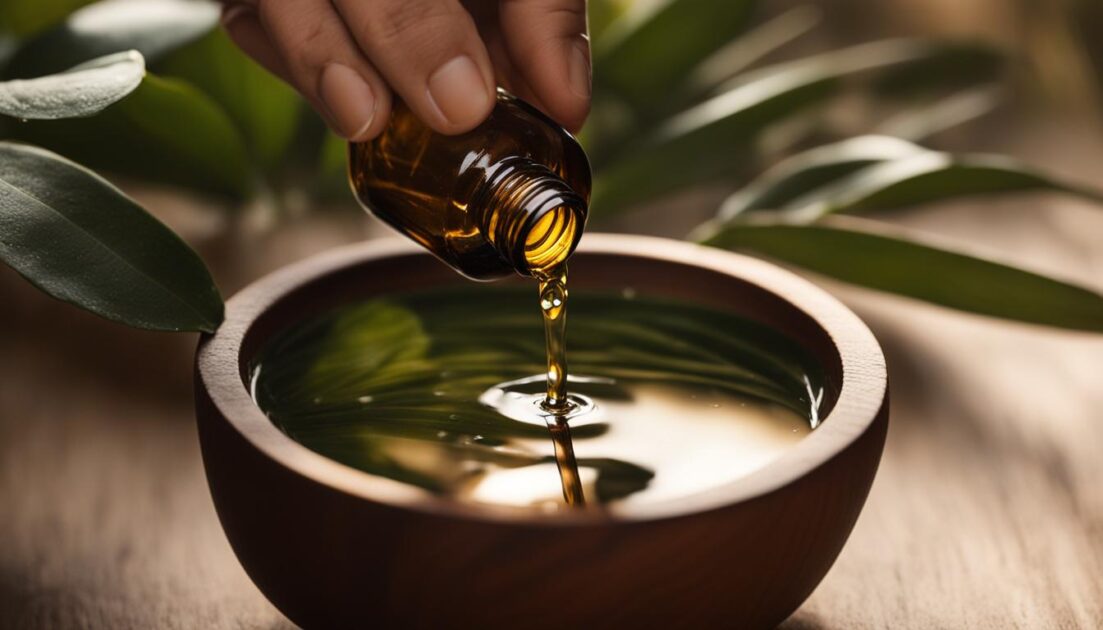Eucalyptus oil, derived from the leaves of the eucalyptus tree, has been used for centuries for its medicinal properties. It offers numerous benefits for the skin and can be incorporated into your skincare routine in various ways. Whether you’re dealing with acne, dryness, oily skin, or eczema, eucalyptus oil may provide the solution you’re looking for.
When it comes to the benefits of eucalyptus oil for skin, the possibilities are endless. Not only does it possess natural healing properties, but it also has a refreshing and invigorating scent that can uplift your senses. Let’s explore some of the fantastic ways eucalyptus oil can enhance your skincare regimen.
Key Takeaways:
- Eucalyptus oil offers a range of benefits for the skin, including acne-fighting properties and moisture balance.
- It can be used in various skincare recipes, such as facial masks, scrubs, and toners.
- Eucalyptus oil is known for its antiseptic properties, making it effective in disinfecting wounds and promoting healing.
- For those with oily skin, eucalyptus oil can help regulate sebum production and reduce clogged pores.
- Individuals with eczema or dry skin can benefit from the moisturizing and soothing effects of eucalyptus oil.
The Benefits of Eucalyptus Oil for Cough Relief and Chest Congestion
Eucalyptus oil has been traditionally used to relieve coughing and clear chest congestion. When inhaled or applied topically, it can help loosen mucus and ease coughing. It is commonly found in cough medications and chest rubs. The oil works by reacting with mucous membranes, reducing mucus production, and helping to expel it from the chest.
Whether you’re dealing with a persistent cough or a nagging chest congestion, eucalyptus oil can offer you much-needed relief. Here’s how it works:
- Loosens mucus: The active compounds in eucalyptus oil have expectorant properties, which means they can break down and thin the mucus in your airways. This makes it easier to expel the mucus and relieve congestion.
- Alleviates coughing: Eucalyptus oil can help reduce coughing by soothing the irritated airways. Its anti-inflammatory properties help calm the inflammation and irritation that trigger coughing.
- Clears the chest: By reducing mucus production and promoting expectoration, eucalyptus oil helps clear your chest of excess mucus, making breathing easier and relieving discomfort.
You can utilize the benefits of eucalyptus oil for cough relief and chest congestion in several ways:
- Inhalation: Add a few drops of eucalyptus oil to a bowl of hot water, cover your head with a towel, and inhale the steam. This can help loosen mucus and clear your airways.
- Topical application: Dilute eucalyptus oil with a carrier oil (such as coconut oil or almond oil) and apply it to your chest. Gently massage it into your skin to promote absorption and enjoy its soothing effects.
- Chest rubs: Look for over-the-counter chest rubs or balms that contain eucalyptus oil. These products are specifically formulated to alleviate cough and chest congestion.
Remember, eucalyptus oil is a powerful and concentrated substance, so it’s essential to use it correctly and in moderation. Diluting it and following the recommended dosage is crucial to avoid any adverse reactions or skin irritations. If you experience any allergic reactions or discomfort, discontinue use and consult a healthcare professional.
Expert Tip:
“For homemade chest rub, mix eucalyptus oil with a carrier oil like coconut oil, and rub it onto your chest before bedtime. The soothing and expectorant properties of eucalyptus oil can help relieve congestion and promote a good night’s sleep.” – Dr. Lisa Jones, Naturopathic Physician

Using Eucalyptus Oil as a Natural Insect Repellent
Eucalyptus oil is a powerful natural solution for keeping pesky insects at bay. It is a safe and effective alternative to chemical-based repellents, such as those containing DEET. One popular brand that utilizes the insect-repelling properties of eucalyptus oil is Repel, while another trusted option is Off!. These brands incorporate oil of lemon eucalyptus, a botanical compound derived from eucalyptus oil, as a key ingredient in their products.
The strong scent of eucalyptus oil acts as a natural deterrent, making it a reliable choice for protecting against mosquito bites and other insect invasions. Whether you’re enjoying a backyard barbecue or camping in the great outdoors, eucalyptus oil can help keep annoying insects away.
To use eucalyptus oil as an insect repellent, you have a few options. First, you can apply it directly to your skin by diluting the oil with a carrier oil, such as coconut or almond oil. This creates a natural barrier that deters insects without exposing your skin to harmful chemicals.
Alternatively, you can add eucalyptus oil to sprays or lotions specifically designed for insect repellent purposes. These products often contain a blend of essential oils, with eucalyptus oil playing a prominent role in deterring mosquitoes and other biting bugs.
| Eucalyptus Oil | Benefits as an Insect Repellent |
|---|---|
| Eucalyptus oil | Naturally repels mosquitoes and other biting insects |
| Contains oil of lemon eucalyptus | An effective botanical ingredient in insect repellent sprays and lotions |
| Safe and natural | Provides protection without the use of harmful chemicals |
Testimonial:
“I’ve always been wary of using chemical insect repellents, especially on my kids. That’s why I turned to eucalyptus oil as a natural alternative. Not only does it keep those pesky mosquitoes away, but it also smells great! I love that it’s safe and effective for the whole family.”
So, the next time you’re planning a picnic, hike, or any outdoor adventure, consider reaching for eucalyptus oil as a natural insect repellent. With its powerful scent and proven effectiveness, you can enjoy your time outdoors without the annoyance of bug bites.

Eucalyptus Oil for Disinfecting Wounds and Promoting Healing
Eucalyptus oil has been used for centuries to disinfect wounds and promote healing. Its natural properties make it an effective option for wound care. The oil contains compounds that have anti-inflammatory and antimicrobial effects, reducing inflammation and preventing infection.
When applied topically, eucalyptus oil can help prevent bacterial growth and aid in the healing process of minor burns or injuries. Its disinfecting properties make it an excellent choice for preventing wound infections.

In addition to its disinfecting properties, eucalyptus oil can also promote wound healing. Its anti-inflammatory effects help reduce swelling and redness, allowing the body to heal more efficiently. The oil can be used as a natural alternative to conventional wound care products.
Using eucalyptus oil on wounds can help prevent infections and speed up the healing process. Its antimicrobial and anti-inflammatory properties make it a valuable addition to your wound care routine.
The oil can be applied directly to the affected area or used in the form of creams and ointments specifically formulated for wound care. These products often combine eucalyptus oil with other healing ingredients to optimize the therapeutic effects.
Tips for using eucalyptus oil for wound care:
- Make sure the wound is clean before applying eucalyptus oil.
- Dilute the oil with a carrier oil, such as coconut oil or olive oil, if applying directly to the skin.
- Use a clean cotton ball or swab to apply the oil to the wound.
- Cover the wound with a sterile bandage or dressing to protect it from dirt and bacteria.
- Monitor the wound regularly for signs of infection or delayed healing. Consult a healthcare professional if necessary.
Eucalyptus oil can be a valuable addition to your first aid kit, providing natural disinfection and promoting the healing process for minor wounds. However, for deep or severe wounds, it is essential to seek medical attention.
Eucalyptus Oil for Respiratory Conditions
Inhaling steam with eucalyptus oil can provide relief for respiratory conditions, including asthma and sinusitis. The unique properties of eucalyptus oil help to alleviate symptoms by reducing mucus production and helping to loosen it. This aids in easier expectoration and clearing of the airways, promoting easier breathing.
For individuals with asthma, caution should be exercised when using eucalyptus oil. While it may provide relief for some, it can potentially worsen symptoms in others. It is advisable to consult with a healthcare professional before incorporating eucalyptus oil into an asthma management plan.
“Inhaling steam with eucalyptus oil can help ease respiratory conditions such as asthma and sinusitis.”
When using eucalyptus oil for sinusitis, steam inhalation is particularly beneficial. Here’s a simple method to try:
- Boil a pot of water.
- Add a few drops of eucalyptus oil to the boiling water.
- Remove the pot from the heat and carefully lean over it, covering your head with a towel to trap the steam.
- Breathe deeply and slowly for about 10 minutes.
- Repeat this process a few times a day or as needed to relieve sinusitis symptoms.
Steaming with eucalyptus oil can help reduce inflammation, loosen mucus, and alleviate discomfort associated with respiratory conditions. It is a natural and refreshing approach to respiratory health.
Eucalyptus Oil for Blood Sugar Control
When it comes to managing diabetes, maintaining stable blood sugar levels is crucial. Eucalyptus oil has emerged as a potential natural remedy for lowering blood sugar levels and assisting in the management of diabetes.
While the exact mechanism by which eucalyptus oil influences blood glucose regulation is not fully understood, preliminary research indicates its potential in this area.
Eucalyptus oil has been shown to lower blood sugar levels, making it an interesting supplement for those with diabetes. However, it is important for individuals with diabetes to exercise caution and consult with their healthcare provider before incorporating eucalyptus oil into their treatment plan. Regular monitoring of blood sugar levels is essential to ensure optimal management.
Further research is needed to better understand the specific effects of eucalyptus oil on blood sugar control and its role in diabetes management. In the meantime, it is advised to approach eucalyptus oil as a supplementary option and not a substitute for conventional diabetes treatments.
Consult with a healthcare professional before incorporating eucalyptus oil into your diabetes management plan.
| Benefits of Eucalyptus Oil for Blood Sugar Control | Precautions |
|---|---|
|
|
“The potential of eucalyptus oil in blood sugar control is an intriguing area of study. However, it is important to approach it as a supplementary option and not a standalone solution.”
Eucalyptus Oil for Cold Sore Relief and Oral Hygiene
Eucalyptus oil’s potent anti-inflammatory properties make it an excellent remedy for cold sores. By reducing pain and promoting healing, this natural oil can provide much-needed relief during outbreaks.
When cold sores occur, applying eucalyptus oil topically can help alleviate discomfort. Its anti-inflammatory properties soothe the affected area, reducing swelling and pain. Additionally, eucalyptus oil’s antiviral properties may help inhibit the replication of the herpes simplex virus, which causes cold sores, aiding in the healing process.
Over-the-counter balms and ointments often contain eucalyptus oil as a key ingredient due to its therapeutic benefits. These products provide a convenient and targeted way to apply eucalyptus oil directly to cold sores for maximum effectiveness.
Furthermore, eucalyptus oil offers oral hygiene benefits by fighting the germs that cause bad breath and promoting a fresh breath. Its antibacterial properties help kill oral bacteria and may prevent plaque buildup, contributing to improved oral health.
Comparison of Eucalyptus Oil for Cold Sore Relief
| Product | Efficacy | Application | Additional Benefits |
|---|---|---|---|
| Over-the-counter balms and ointments | Effective in reducing pain and promoting healing | Directly applied to cold sores | May contain additional ingredients for enhanced soothing and antiviral properties |
| Eucalyptus oil mouthwash | Can help fight oral bacteria and freshen breath | Rinsed in the mouth | May have a cooling sensation and leave a refreshing taste |
| Eucalyptus oil toothpaste | Promotes oral hygiene and reduces bad breath | Used for regular brushing | May contain additional ingredients for superior plaque control and cavity prevention |
Remember to consult a healthcare professional before trying any new treatment, especially if you have existing medical conditions or are using other medication. They can provide personalized guidance and ensure eucalyptus oil is a suitable option for your specific needs.
Eucalyptus Oil for Joint Pain Relief
Are you tired of living with joint pain? Eucalyptus oil may offer you some relief. Research suggests that eucalyptus oil, known for its anti-inflammatory properties, can help ease joint and muscle pain.
Many over-the-counter creams and ointments, specifically formulated for pain relief, contain eucalyptus oil as a key ingredient. These products are commonly used to soothe pain caused by conditions like osteoarthritis and rheumatoid arthritis, providing temporary relief from discomfort.
Whether you’re experiencing back pain or recovering from a joint or muscle injury, eucalyptus oil may be beneficial. However, it’s important to consult with a healthcare professional before incorporating eucalyptus oil into your pain management routine. They can provide guidance specific to your unique needs and ensure it is safe for you to use.
Consider adding eucalyptus oil to your pain relief toolkit and discover the potential benefits it may bring for your joint and muscle discomfort. Remember to always prioritize your wellbeing and consult with your healthcare provider for personalized advice.
FAQ
What are the benefits of using eucalyptus oil for skin?
Eucalyptus oil offers various benefits for the skin, including relieving coughs, clearing the chest, repelling insects, disinfecting wounds, easing respiratory conditions, controlling blood sugar, soothing cold sores, freshening breath, and easing joint pain.
How can eucalyptus oil help with cough relief and chest congestion?
When inhaled or applied topically, eucalyptus oil can help loosen mucus and ease coughing. It reacts with mucous membranes, reducing mucus production and helping to expel it from the chest.
Can eucalyptus oil be used as a natural insect repellent?
Yes, eucalyptus oil can be an effective alternative to DEET sprays for repelling mosquitoes and other biting insects. It can be applied topically or added to sprays or lotions.
How can eucalyptus oil help in disinfecting wounds and promoting healing?
Eucalyptus oil’s anti-inflammatory properties reduce inflammation and prevent infection. It can be applied topically to minor burns or injuries to prevent bacterial growth and aid in the healing process.
Can eucalyptus oil be used for respiratory conditions?
Inhaling steam with eucalyptus oil can help ease respiratory conditions such as asthma and sinusitis. It reacts with mucous membranes, reducing mucus production and helping to loosen it for easier clearing of the airways.
Does eucalyptus oil have any impact on blood sugar control?
Eucalyptus oil has shown potential as a treatment for diabetes, as it may help lower blood sugar levels. However, individuals with diabetes should carefully monitor their blood sugar levels and consult with their healthcare provider before using eucalyptus oil.
Can eucalyptus oil provide relief for cold sores and help with oral hygiene?
Yes, eucalyptus oil’s anti-inflammatory properties can help reduce pain and promote healing of cold sores. It can be applied topically or found in over-the-counter balms and ointments. Additionally, it is an effective ingredient in mouthwashes and toothpastes for fresh breath and fighting germs.
How can eucalyptus oil help with joint pain relief?
Research suggests that eucalyptus oil can help ease joint and muscle pain. It is commonly found in over-the-counter creams and ointments used to soothe pain from conditions like osteoarthritis and rheumatoid arthritis. Its anti-inflammatory properties reduce pain and inflammation.






